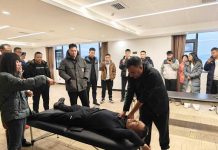BEIJING: China plans to redouble its efforts in improving the quality of human resources and boosting the provision of childcare and basic elderly care services to promote its high-quality demographic development, according to a key policy document and experts.
Declining birthrates and a rapidly aging society are defining features of China’s demography, according to a resolution adopted last month by the third plenary session of the 20th Central Committee of the Communist Party of China.
Cai Fang, chief expert of the National High-end Think Tank, a division of the Chinese Academy of Social Sciences, said that in 2022, China’s total population began declining and the ratio of people age 65 and above exceeded 14 percent — a sign of entering a moderately aged society.
Last year, the nation’s total population fell by 0.148 percent year-on-year and the proportion of seniors further rose to 15.4 percent.
“The document’s call for instituting a system to provide full life-cycle population services and advance high-quality population development is aimed at adjusting to these emerging demographic features,” he said.
A “full-cycle” system should encompass all aspects of livelihood, from marriage and childcare to employment, medical services and housing, and should take all age groups into consideration, Cai said in an article explaining the document.
Li Tongping, an economics and demography professor at China University of Geosciences in Wuhan, Hubei province, said that the rising education and health levels of Chinese people in recent decades have laid a solid foundation for further upgrading human resources quality.
Official data shows that the gross enrollment rate for China’s nine-year compulsory education has reached 95.7 percent, and the enrollment rate for high schools has risen to 91.8 percent. The gross university enrollment rate has exceeded 60 percent.
“The average life expectancy in China has also increased to 78.2 years,” he said. “These are all significant achievements in bolstering the quality and capabilities of the population, and stronger and continuous efforts are needed.”
The policy document also calls for building a fertility-friendly society, which entails measures to advance systems related to maternity leave, maternity subsidies, and maternal and child healthcare, as well as to roll out tax-deduction policies for childrearing and bolstering nursery care services.
Panzhihua, a city in Sichuan province that became the first nationwide to offer cash for parents with a second or third child in 2021, announced last week that it will soon begin to give nursery care subsidies for babies age 3 or younger. The new measure is aimed at further reducing the child-rearing costs of families, said the local government.
Cai said that as regions across the nation are rolling out subsidies linked to newborns, it is now important to consolidate these different policies, increase the subsidies and expand their coverage. –The Daily Mail-China Daily news exchange item






